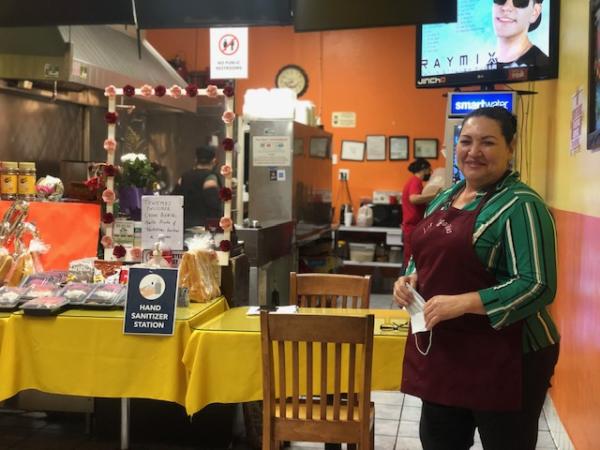California business owner struggles to stay afloat after being targeted by predatory lenders

More than a year and a half into the pandemic, many small businesses are unsure if they will be able to recover after fighting to stay above water and accruing crippling debt. Small business owners of color, women and immigrants have been disproportionately impacted by the pandemic as they’ve faced barriers to accessing federal relief programs and traditional lending. Small business owner Daysi Del Rosario Rivas Peralta is one example.
Daysi has owned Las Segovias Nicaraguan Restaurant in Huntington Park, Calif. for nine years, but never in her career as a business owner has she experienced such debilitating setbacks. Daysi is currently more than $11,000 behind in rent payments. Not only did her profits drop by more than 50% in 2020, but she also struggled to access any funding through federal relief programs due to her status as an Individual Taxpayer Identification Number (ITIN) holder.
Although it initially wasn’t clear when the programs launched if ITIN holders were eligible, Daysi worked with a consultant to apply for a Paycheck Protection Program (PPP) and an Economic Injury Disaster Loan (EIDL). However, she never heard a response about her applications, and she now believes she may have mistakenly applied through a fraudulent company.
Daysi was then approached by lenders who would walk into her restaurant offering flexible capital options. Desperate for capital, Daysi took these lenders up on their offer. Over the course of the last year, she took out four merchant cash advances (MCAs) totaling $25,000 and is now drowning in the double-digit and triple-digit interest fees. Some of the lenders Daysi worked with did not provide paperwork providing clear information about the interest fees, but she felt like she had no choice other than to accept the loan terms as she desperately needed the money. Lenders were automatically withdrawing $300 per week from Daysi’s bank account, but she couldn’t keep up with payments. Daysi ended up taking out more loans just to cover the fees from previous lenders. As of now, Daisy does not know if she will be able to stay open through the end of the year and fears she will not be able to renew her lease.
Unfortunately she is not alone. Currently the federal Truth in Lending Act (TILA) requires that consumer creditors disclose critical financing information, including annual percentage rate (APR), in a clear and comparable format. However, Congress has yet to extend these disclosure requirements to small business loans and other credit products, which means small businesses are vulnerable to irresponsible lenders. The COVID-19 pandemic left thousands of small business owners vulnerable to predatory lenders, especially those who were left behind by federal funding programs and who faced language and technology barriers.
Small businesses need federal legislation extending TILA disclosure requirements to small business financing so small business borrowers have a clear picture of their loan terms and do not fall victim to predatory practices that will leave them in a debilitating debt cycle. If we do not make these changes now, countless small businesses will continue to struggle.
Sign our letter calling on Congress to protect small business borrowers from predatory lenders by passing the Truth in Lending Act.
